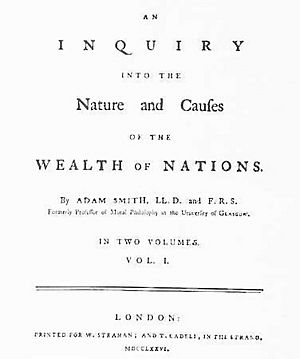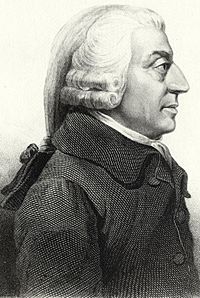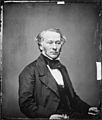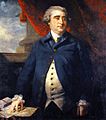The Wealth of Nations facts for kids
The Wealth of Nations is a very important book written by a Scottish thinker named Adam Smith in 1776. Its full name is An Inquiry into the Nature and Causes of the Wealth of Nations. This book talks about how countries become wealthy. It looks at ideas like how people specialize in jobs, how people act in their own best interest, and how trade should be free.
Before this book, many people thought a country's wealth was just how much gold or silver its king had. But Smith had a new idea. He said a country's wealth should be measured by the total income of all its people each year. He wanted to find out how this wealth could grow.
Smith believed that land, labor (work), and capital (money or tools) were the main things that helped a nation get rich. These are sometimes called "factors of production".
Contents
How Prices Work: Supply and Demand
Prices for things naturally change based on how much of something there is and how much people want it. This is called supply and demand.
When There's Too Much (Supply)
If there is a lot of something, like too many apples, prices usually go down. This makes people want to buy more of them.
When Everyone Wants It (Demand)
If many people want something, but there isn't much of it, prices go up. People will compete to buy it, and some will pay more to get what they want.
Why Free Markets Are Good
Adam Smith thought that markets should be free. This means that buyers and sellers should be able to trade without too much government control.
Problems with Government Control
In Smith's time, some big companies were controlled by the government. Sometimes, rulers made rules that helped themselves but hurt workers or customers. For example, people in the American colonies could grow cotton. But they were not allowed to make clothes from it. They had to send the cotton to England. Then, they had to buy the finished clothes back from England. Smith said this was bad for everyone.
The "Invisible Hand" Idea
Smith believed it was better for money to move freely between buyers and sellers. He thought that if people did what was best for themselves, it would also help society. It was like an "invisible hand" was guiding everything to work out for the best. Money would naturally go to sellers who made the best products at the best prices.
Images for kids
-
Edward Gibbon praised The Wealth of Nations
-
Charles James Fox was the first person to mention The Wealth of Nations in Parliament.
See also
 In Spanish: La riqueza de las naciones para niños
In Spanish: La riqueza de las naciones para niños
 | James Van Der Zee |
 | Alma Thomas |
 | Ellis Wilson |
 | Margaret Taylor-Burroughs |








